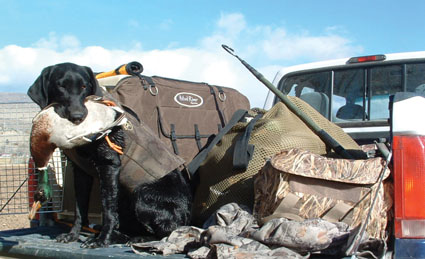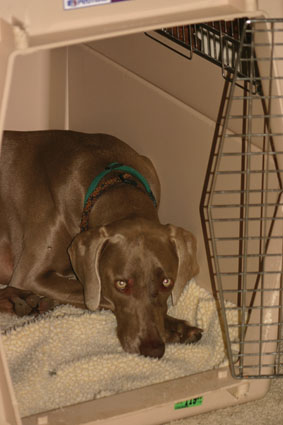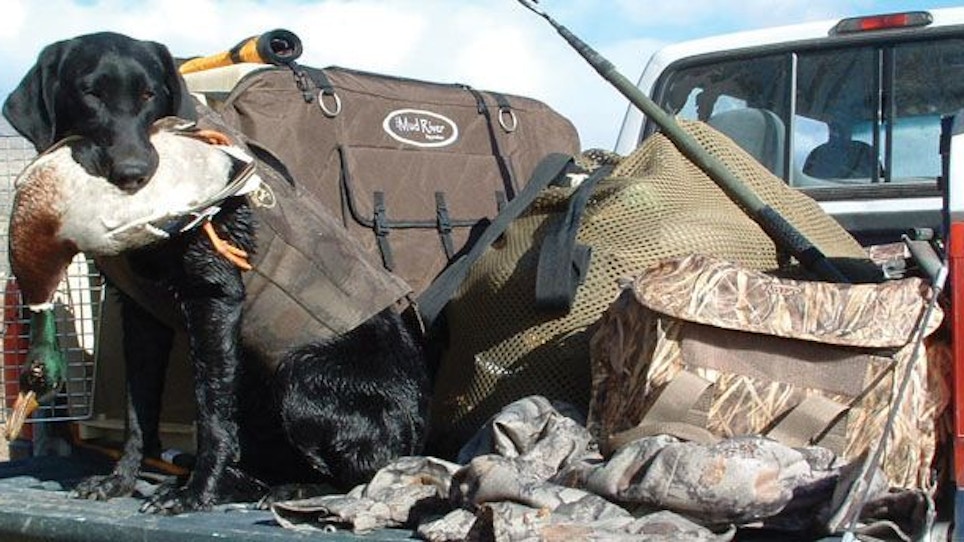 You hunted hard all day yesterday, and it’s the wee early hours of the morning when your dog suddenly needs out to use the bathroom. Don’t just crack the motel room door and let Rover roam and relieve, no matter how weary you are and eager to return to bed. There might be dangers out there that you wouldn’t want your dog to encounter. Watch him.
You hunted hard all day yesterday, and it’s the wee early hours of the morning when your dog suddenly needs out to use the bathroom. Don’t just crack the motel room door and let Rover roam and relieve, no matter how weary you are and eager to return to bed. There might be dangers out there that you wouldn’t want your dog to encounter. Watch him.
A first concern is the cars that zip through parking lots and around every corner. When it’s dark, your dog becomes nearly invisible. Also, your dog could encounter raccoons, other dogs and even coyotes around the ever-present dumpsters found at motels. Such an encounter might lead to a fight or chase that spills into a nearby highway. Raccoons, in particular, are carriers of rabies.
On the road, nearly any parking lot can be an obstacle course of an unwanted source for antifreeze and spoiled human food. If your dog ingests such attractive nuisances, it can be fatal to him. The best that you might hope for is that your dog will only be out of action for a few days. Dogs should always be leashed — and under immediate control and supervision — at any rest area, truck stop, roadside park or gas station.
And remember to lock up everything when you head into a restaurant if you stop while traveling. It only takes a minute to keep your dog secure — and it only takes less than a minute for someone to steal him.
Pack For Your Dog’s Comfort
Road trips can be stressful for your dog, or, if done properly, can be fun or at least comfortable. Take along blankets, fluffy dog beds and other personal gear your dog likes. I also toss in a few towels to wipe paws or clean up messes. And there are several sources for pet wipes. If you travel often to hunt, consider packing such items in a travel bag that stays in your truck until hunting season is over for the year.
To keep any dog healthy, remember to frequently clean kennels and bowls. A Clorox wipe will work to clean most kennels. All feeding and watering bowls, however, that touch the ground anywhere should be cleaned daily with hot soapy water and rinsed well. This can be accomplished in the motel room.
 Along with containers of dog food that seal airtight, I also pack water jugs. In most cases the inexpensive gallon jugs found at supermarkets work fine. Another reason to carry water is that it’s available when your dog wants it, and you don’t have to search far and wide for a spigot — or question the water source. Never let your dog drink from a puddle or a stream if you can help it.
Along with containers of dog food that seal airtight, I also pack water jugs. In most cases the inexpensive gallon jugs found at supermarkets work fine. Another reason to carry water is that it’s available when your dog wants it, and you don’t have to search far and wide for a spigot — or question the water source. Never let your dog drink from a puddle or a stream if you can help it.
Finally, never leave a dog in a hot vehicle for any period of time, especially on hot days. If you’ll be parking and leaving the vehicle engine running, be alert for another danger — carbon monoxide poisoning. Truck beds with large drain holes or rusty openings combined with rusty or worn exhaust systems can combine to asphyxiate a dog. On the other side of the coin, should you leave your dog inside a truck cab with the engine and A/C running, be certain that he is tied or confined so that he can’t engage the gear shift or release a parking brake. Such “driving” dogs make headlines every year, usually because of the accidents they cause.
Life on the highway can be filled with dangers for dogs, but most can be avoided or anticipated and overcome if you prepare and plan properly. At the end of a long trip, your reward for doing things right is the companionship and good service of your best hunting buddy.
A Doggie First-Aid Kit Checklist:
• Benadryl
• Splints
• Large towel for use as a blanket
• Gauze wrap and scissors to cut it
• Hydrogen peroxide, iodine and saline solutions
• Latex gloves
• Cotton swabs and balls
• Small, clean, absorbent towels
• Pepto-Bismol chewable tables
• Forceps
• Hydrocortisone and Neosporine creams
• Gatorade or Pedialyte for dehydrated dogs
• Karo syrup for exhaustion problems or heat stroke
• Pack a muzzle and a leash to protect yourself and your dog. Some injured and frightened dogs don’t want anyone touching them, including the owner.






